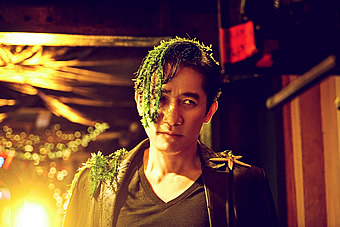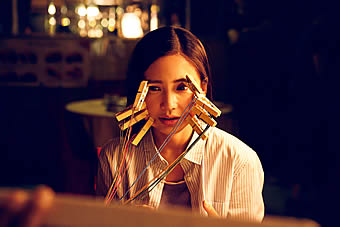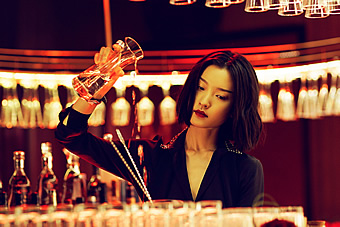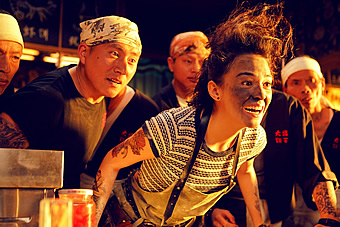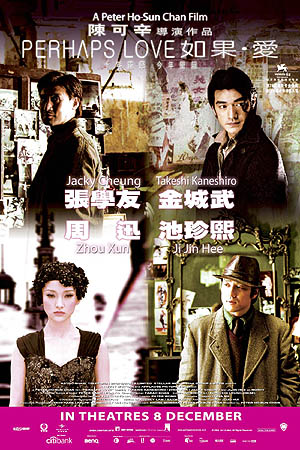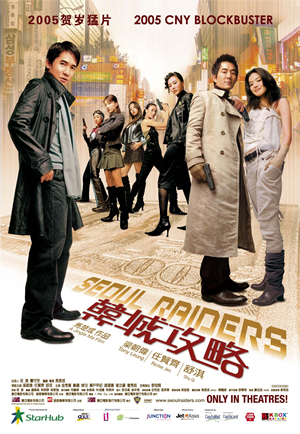SEE YOU TOMORROW (摆渡人) (2016)
Genre: Comedy
Director: Zhang Jia Jia
Cast: Tony Leung, Takeshi Kaneshiro, Angelababy, Du Juan, Sandrine Pinna, Lynn Xiong, Lu Han, Da Peng, Li Yuchun, Eason Chan
Runtime: 2 hrs 8 mins
Rating: PG13 (Scene of Intimacy)
Released By: Shaw
Official Website:
Opening Day: 24 December 2016
Synopsis: In this topsy turvy world, every city needs to have its “navigators”; especially skilled guides able to cure the world of a wide range of relationship troubles. Bar owner Chen Mo and his associate Guan Chun are legendary. Though their ways seem sloppy and uncoordinated, their results are first-rate. Supermen in the art of navigation, if you can book them, there is no river of pain they can’t take you across. Girl-next-door Xiao Yu hires them to guide her idol, troubled singer Ma Li, but in the course of helping her find the path forward, Chen Mo and Guan Chun finally face their own problems in an epic act of self-discovery that brings their lives from towering highs to withering lows.
Movie Review:
Except for Jeffrey Lau’s ‘Chinese Odyssey’ series, no other film has had the honour of bearing notoriously finicky auteur Wong Kar Wai as its producer, which is reason in itself to be intrigued about ‘See You Tomorrow’. In fact, Wong is not only producer but also co-screenwriter next to writer-cum-director Zhang Jiajia, on whose short story this full-length feature film is based on.
The premise is arguably simple but appealing – if navigating through life’s ups and downs can sometimes be akin to trying to cross a stormy sea, then it doesn’t hurt to have the help of a ferryman to show us the way back to shore. As Tony Leung’s opening voiceover narrates, it doesn’t matter what sort of tumult one may be going through – be it a quarrel, a breakup, a retrenchment or even a fit of anger – a ferryman guides the hurt and confused through the four stages of ‘I’m here’, ‘I’m tired’, ‘I’m ok’ and ‘I’m gone’.
So it goes that the best ferryman in town is none other than Chen Mo (Leung), the owner of a bar named ‘See You Tomorrow’ where the lost and despairing go to for help. Chen Mo’s associate is the bar’s deejay Guan Chun (Takeshi Kaneshiro), who takes his place if the former is unavailable. Not everyone though is satisfied with the duo, and one such disgruntled individual is radio deejay Xiao Yu (Angelababy), who lives right next door to their bar and has to put up with the din from their establishment every single night.
Narratively speaking, ‘See You Tomorrow’ is really a collection of three loosely connected stories revolving around the respective romantic struggles of Chen Mo, Guan Chun and Xiao Yu. Though a first-class navigator, Chen Mo remains haunted by the love of his life He Muzi (Du Juan), a legendary bartender known for her concoctions so powerful that no one has gotten past more than one drink. In particular, Chen Mo falls under the spell of a titular drink, and in a nicely-edited montage, is seen returning night after night for the same poison despite being rendered unconscious before stepping out of the bar and getting injured in the process.
Why He Muzi is no longer in Chen Mo’s life is not revealed till the end, but we learn that Chen Mo is so affected by her absence that he needs to wear a doctor’s prescribed watch lest some stimulus triggers a distant but severe memory and a subsequent meltdown. Though Chen Mo’s personal travails take precedence over that of Guan Chun and Xiao Yu, his segment is arguably the weakest and least developed; instead, Chen Mo largely plays the role of wonder-counsellor, guiding and accompanying Guan Chun and Xiao Yu through their distresses. That calls for Leung to act suave and unflappable most of the time – which the veteran actor does so effortlessly with plenty of charm and charisma – but doesn’t much call for him to exert much acting muscle beyond that.
On the other hand, Kaneshiro is given free rein to go completely over-the-top playing the desperate lover pining for Mao Mao’s (Sandrine Pinna) affections. Like Chen Mo, Guan Chun has his own baggage with Mao Mao – which explains why the former’s ‘Hokkien-beng’ meet-cute with the latter that is set to Yuan Xiao Di's classic '重出江湖' is greeted with outright hostility by her brother. Without spoiling any surprises, let’s just say that Guan Chun and Mao Mao had met and fallen in love in their younger days when he was a ‘King of Fighters’ arcade champion and she a deliverywoman for her father’s ‘jian bing’ business. It is in fact to continue her late father’s legacy that Mao Mao has returned, albeit with no memory of her previous relationship with Mao Mao or why she left in the first place.
As exaggerated as some of Guan Chun’s antics to woo Mao Mao may be, Kaneshiro throws himself fully into the role and so provides some of the film’s biggest laughs. One running joke revolves around the lengths that Guan Chun goes in order to conceal how bad Mao Mao’s biscuits actually taste, and whilst others can stand no more than a bite, Guan Chun proves his love by eating one that is literally ‘on fire’, returning again for another one even bigger but tastes no better, and trying to help her business by getting regulars at his ‘See You Tomorrow’ bar to buy one biscuit at her shop in exchange for a bottle of alcohol at his. Kaneshiro and Pinna also have great rapport, and their heartfelt performances add poignancy to a romance sprung from cheerful adolescent insouciance.
Competing for attention with Guan Chun’s segment is that involving Xiao Yu, who has been in love with rock singer Ma Li (Eason Chan) since she was afflicted with a potentially life-threatening illness during university – though Ma Li apparently looked less like Eason than ‘Star Wars’ China ambassador Lu Han when he was young. The older Ma Li turns up drunk one night at Xiao Yu’s place, and it turns out that his girlfriend cum manager Jiang Jie (Lynn Hung) had recently not only rejected his marriage proposal but also tells him she has already been seeing someone else. Xiao Yu ends up turning to Chen Mo for help to ‘ferry’ Ma Li out of his depression, and Chen Mo goes one step further by volunteering to teach Xiao Yu the tricks of the ‘ferryman’ trade.
As much as Xiao Yu’s angle gets the most screen time, her part is also the most distracted. Chen Mo’s tutelage of Xiao Yu consists of two lessons in empathy – one involving Sam Lee as ‘Chicken’ a la ‘Young and Dangerous’ who enlists Chen Mo to cure his heartbroken sister; and another involving a forlorn woman who coops herself up in the back of a limousine wearing her wedding dress. Slightly more relevant but certainly overlong is Xiao Yu’s feud with Jiang Jie depicted over a ‘Bar Golf’ challenge, where each has to race to complete challenges at nine different watering ‘holes’ in one single night that is meant as much as a test of one’s alcohol tolerance as one of mental endurance.
These distractions dilute the impact of a meaningful lesson on selfless love, one based not on any personal gratification in return but solely on the other’s wellbeing and happiness. There is also even less character development here than with Guan Chun and Mao Mao, so despite Chan’s efforts at injecting pathos into his character of Ma Li, there isn’t much soul in his moping façade. Ditto for Angelababy and Lynn Hung, the former defined almost singularly by her crush on Ma Li and the latter by her sheer ego in refusing to let go of her claim over Ma Li despite breaking up with him.
In fact, one suspects that the somewhat underdeveloped narrative overall is meant largely as a bridge between heavily-edited montages, which seems to be Zhang’s mode of storytelling. Indeed, many of these unfold over iconic songs from the 80s and 90s – like Beyond’s ‘喜欢你’, Ekin Cheng’s ‘甘心替代你’ and Eason Chan’s own ‘十年’ – and if anything, will likely be perfectly nostalgic for those who grew up listening to these ditties. Christopher Doyle may not have joined this Wong Kar Wai-produced effort, but veteran cinematographer Peter Pau’s bright neon-coloured images ensure that these montages are visually appealing at the very least.
To be sure, ‘See You Tomorrow’ was never intended to be a Wong Kar Wai classic; instead, as its opening credits mention, it is meant to coincide with the twenty-fifth anniversary of Wong’s Jet Tone Films, and could very well be their most commercial release to date. At best, it is the cinematic equivalent of ‘New Year’s Eve’ or ‘Valentine’s Day’ for Chinese cinema, given the similarities in structure and some will say quality; at worst, it is a triptych of thinly conceived romances strung together in MTV-like fashion. But ‘See You Tomorrow’ is not without its pleasures – especially Kaneshiro’s hammy but hilarious performance – and as a feel-good or ‘feel-love’ release in time for Christmas, it’ll leave you in a bittersweet yet sanguine mood that will make you want to embrace your loved ones all over again.
Movie Rating:




(Despite some unnecessary detours along the way, this MTV-styled triptych of romances alternately amusing, over-the-top and melodramatic brings you on a voyage bittersweet, sanguine and full-of-feeling)
Review by Gabriel Chong
You might also like:
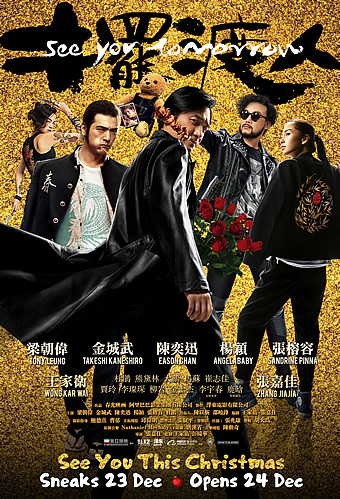
Movie Stills
